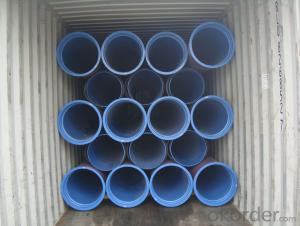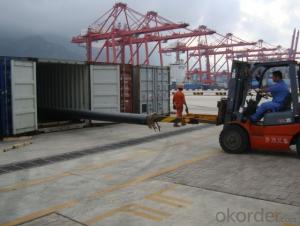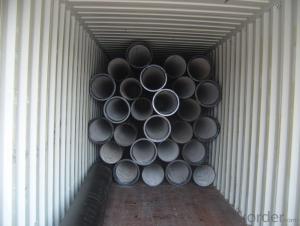Ductile Iron Pipe DN900
OKorder Service Pledge
Quality Product, Order Online Tracking, Timely Delivery
OKorder Financial Service
Credit Rating, Credit Services, Credit Purchasing
You Might Also Like
Specifications
Quick Details
| Place of Origin: | China (Mainland) | Brand Name: | CMAX | Model Number: | T type / K type / Flange type |
| Length: | 6m / 5.7m / Negotiable | Standard: | ISO2531 / EN545 / EN598 | Application: | Potable / Sewage water |
| Diameter: | DN80~DN2200 | Shape: | Round | Hardness: | 230 |
| Pipe Wall Thickness: | standard | Pull Strength: | 420 | Yield (≥ MPa): | 300 |
| Material: | Ductile Iron | Type: | Centrifugal ductile cast iron pipe | Certification: | ISO2531 / EN545 / EN598 |
| Outer Diameter: | 80-2200 | Thickness: | standard | Specification: | DN80~DN2200 |
| |
The advantages to the customer:
Trustworthy financial strength.
One-stop shopping.
Fast and efficient service.
Coordination of shipments from multiple plants.
Specialists of the overseas shipping process.
A more competitive price.
- Q:Can ductile iron pipes be used for water distribution networks in rural areas?
- Ductile iron pipes are suitable for water distribution networks in rural areas due to their high strength and durability. These pipes are known for their ability to withstand external loads and pressure, making them ideal for underground installations. Additionally, they have excellent resistance to corrosion and can withstand harsh environmental conditions or agricultural activities. In rural areas, where the water distribution network may face challenging conditions, ductile iron pipes offer a reliable solution. They are less likely to crack or leak, ensuring a continuous water supply for rural communities. Moreover, these pipes have a long service life, often exceeding 100 years, making them a cost-effective choice that requires minimal maintenance and replacement. However, it is crucial to consider other factors such as the availability of ductile iron pipes, installation costs, and the technical expertise required for installation and maintenance. Local regulations and standards should also be followed to ensure compliance and safety. Overall, ductile iron pipes can provide a suitable and dependable option for water distribution networks in rural areas. They offer a long-lasting and efficient solution for delivering clean water to communities.
- Q:How can the steel plastic composite pipe be connected with the cast iron pipe?
- The hoop has the advantages of beautiful appearance, convenient operation, strong clamping force, good sealing performance, etc.. Mainly used for connecting and fastening vehicle, ship, diesel engine, gasoline engine, machine tools, fire, and other machinery and equipment, chemical equipment general nylon hose, plastic hose, hose cloth, water interface and seal etc..
- Q:How are ductile iron pipes inspected for quality control?
- Ductile iron pipes are inspected for quality control through various methods such as visual inspection, hydrostatic pressure testing, dimensional checks, and non-destructive testing techniques like ultrasonic testing. These inspections ensure that the pipes meet the required specifications and standards, and any defects or abnormalities can be detected before installation or use.
- Q:The plug connection DN800 ductile iron pipe has been installed. "Shall I think so?"
- The main components of ductile iron pipes are carbon, silicon, manganese, sulfur, phosphorus and magnesium. Perform standard [span]GB/T13295-2003 ISO2531/2003
- Q:Are ductile iron pipes compatible with other pipe materials?
- Generally, other pipe materials can be compatible with ductile iron pipes. The high level of flexibility and strength of ductile iron pipes allows for their connection with various materials like PVC, HDPE, and steel. Transition fittings are often utilized to securely and prevent leaks when connecting ductile iron pipes with other materials. To maintain the integrity of the pipeline system and ensure compatibility, it is crucial to follow industry standards and guidelines when joining different pipe materials.
- Q:What is the expected deflection limit of ductile iron pipes?
- The expected deflection limit of ductile iron pipes is typically around 2% of the pipe's diameter, as per industry standards.
- Q:Which is good for water polo cast iron pipe steel pipe?
- The advantage of ductile iron pipe is cheap, corrosion resistance, lack of toughness is poor, not easy to process
- Q:What are the different types of joints used in ductile iron pipes?
- The different types of joints used in ductile iron pipes include push-on joints, restrained joints, mechanical joints, flanged joints, and welded joints.
- Q:Can ductile iron pipe be used for both water and wastewater applications?
- Ductile iron pipe is versatile and can be used for water and wastewater applications. It is made by treating iron with small amounts of magnesium, resulting in a material that is both flexible and durable. This flexibility and durability make it suitable for transporting both water and wastewater. Its high strength and resistance to corrosion make it ideal for underground applications. Ductile iron pipes can handle the high pressures and varying flow rates commonly found in water distribution systems, as well as the corrosive properties of wastewater. In addition, they have a longer lifespan compared to other materials like PVC or concrete, which are commonly used for water and wastewater projects. Therefore, ductile iron pipes are often chosen for reliable and long-lasting water and wastewater transport.
- Q:Are ductile iron pipes suitable for installation in rocky or hard soil conditions?
- Ductile iron pipes are a great choice for rocky or hard soil conditions. They are known for their strength and durability, which makes them perfect for challenging soil conditions. These pipes have a high tensile strength, allowing them to handle external loads and pressures, even when there are rocks or hard soil present. Furthermore, they are resistant to corrosion, making them even more suitable for installation in such conditions. The pipes' flexibility and ability to withstand bending stresses also make them reliable for rocky or hard soil conditions, as they can adapt to ground movement without compromising their structural integrity. Overall, ductile iron pipes are the preferred option for installations in challenging soil conditions because of their robustness, longevity, and resilience.
1. Manufacturer Overview |
|
|---|---|
| Location | |
| Year Established | |
| Annual Output Value | |
| Main Markets | |
| Company Certifications | |
2. Manufacturer Certificates |
|
|---|---|
| a) Certification Name | |
| Range | |
| Reference | |
| Validity Period | |
3. Manufacturer Capability |
|
|---|---|
| a)Trade Capacity | |
| Nearest Port | |
| Export Percentage | |
| No.of Employees in Trade Department | |
| Language Spoken: | |
| b)Factory Information | |
| Factory Size: | |
| No. of Production Lines | |
| Contract Manufacturing | |
| Product Price Range | |
Send your message to us
Ductile Iron Pipe DN900
OKorder Service Pledge
Quality Product, Order Online Tracking, Timely Delivery
OKorder Financial Service
Credit Rating, Credit Services, Credit Purchasing
Similar products
New products
Hot products
Hot Searches
Related keywords




























